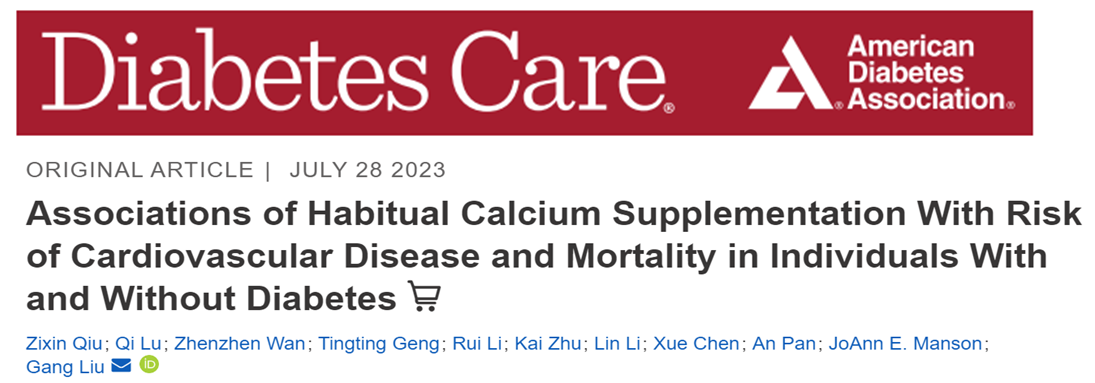On July 28, 2023, Diabetes Care recently published the new findings of Professor Liu Gang's team from the School of Public Health entitled "Associations of Habitual Calcium Supplementation With Risk of Cardiovascular Disease and Mortality in Individuals With and Without Diabetes". The study suggested that habitual use of calcium supplements was significantly associated with a higher risk of CVD events and mortality in people with diabetes but not in people without diabetes.

Calcium, the most abundant mineral in the body, is important for bone health and several major physiologic functions. Calcium supplements are widely used to prevent osteoporotic fractures, and thus, any beneficial or adverse effects of calcium supplements on health are of great public health importance. Recent evidence regarding the health effects of calcium supplements on cardiovascular disease (CVD) risk has been inconsistent and inconclusive. Previous experimental studies suggested that supplemental calcium could abruptly increase blood calcium levels, which may be harmful to cardiovascular health. As for epidemiological evidence, most studies revealed a null association in general populations, but others raised concerns about the cardiovascular safety of calcium supplement use, particularly in those at higher risk of CVD and impaired calcium metabolism. Compared with the general population, patients with diabetes, have a two- to fourfold higher risk of developing CVD and premature death and have a relatively higher prevalence of abnormal calcium homeostasis such as elevated extra- and intracellular calcium levels. Therefore, it is imperative to clarify the association between calcium supplements and the risk of CVD and mortality in people with diabetes. However, evidence in this regard is scarce, and whether and the extent to which the associations differ between people with and without diabetes remains unknown.
This analysis included 434,374 participants (n=21,676 with diabetes). Over a median follow-up of 8.1 and 11.2 years, 26,374 incident CVD events and 20,526 deaths were documented, respectively. After adjustment for or stratification by multiple confounding factors (i.e., dietary and lifestyle factors, other supplements use, serum vitamin D levels, and eGFR), we found:
People with diabetes who took long-term calcium supplements had a 34% increased risk of CVD incidence (HR 1.34; 95% CI 1.14, 1.57), CVD mortality (HR 1.67; 95% CI 1.19, 2.33), a 67% increased risk of CVD mortality (HR:1.67, 95% CI: 1.19-2.33), and a 44% increased the risk of all-cause mortality (HR: 1.44, 95% CI: 1.20-1.72)
The results indicated that habitual use of calcium supplements was significantly associated with a higher risk of CVD outcomes and all-cause mortality in people with diabetes but not in those without diabetes. Notably, there was no significant association between dietary calcium intake and CVD and mortality risk in people with diabetes. Collectively, our results suggest that patients with diabetes might need to be cautious about habitual use of calcium supplements, but moderate calcium intakes from food sources are still recommended. Further studies are warranted to balance the potentially adverse effects of calcium supplements against the likely benefits, particularly among people with diabetes.
The above study is another important finding of the team based on the previous research on dietary factors (e.g., serum vitamin D, carotenoids, selenium, folic acid, vitamin B12, and different dietary patterns) and the risk of complications and premature death in people with diabetes (Diabetes Care 2021; PLoS Medicine 2022; Diabetes Care 2022; JAMA Network Open 2022; AJCN 2022; Diabetes Care 2023). This series of research results provide an essential scientific basis for dietary nutrition and health management of T2D patients.
Zixin Qiu, PhD student from the School of Public Health at Huazhong University of Science and Technology, was the first author, and Prof. Gang Liu was the corresponding author. The research work was supervised by Prof. An Pan from Huazhong University of Science and Technology and Prof. JoAnn E Manson from Harvard University.


